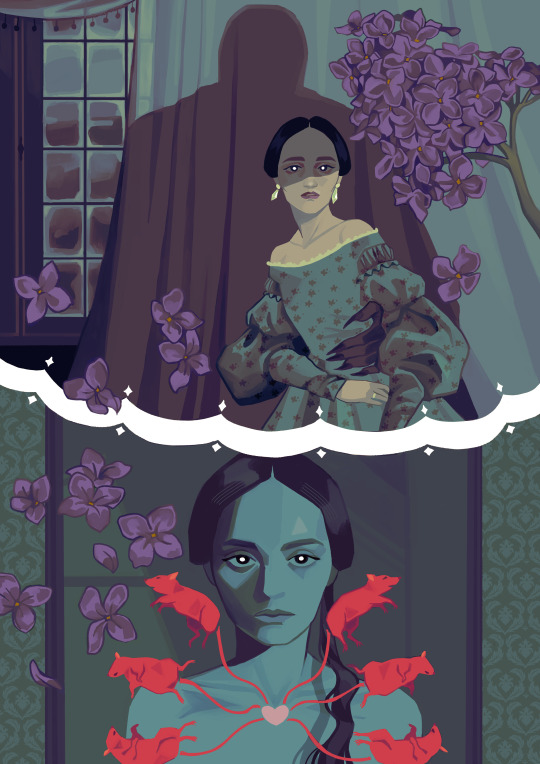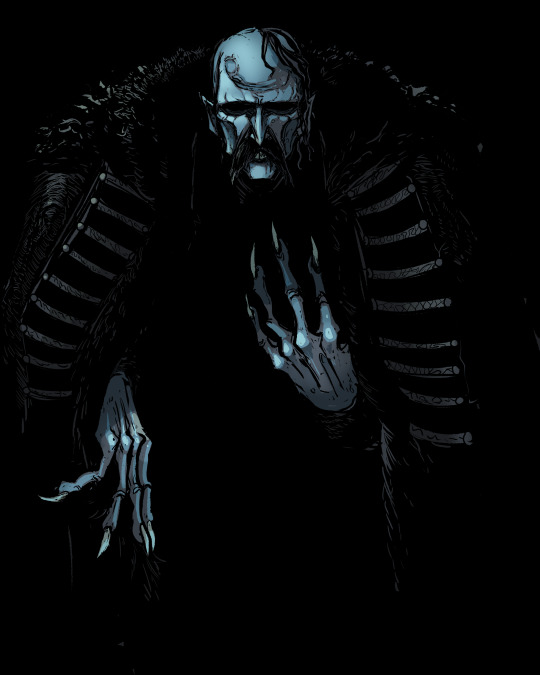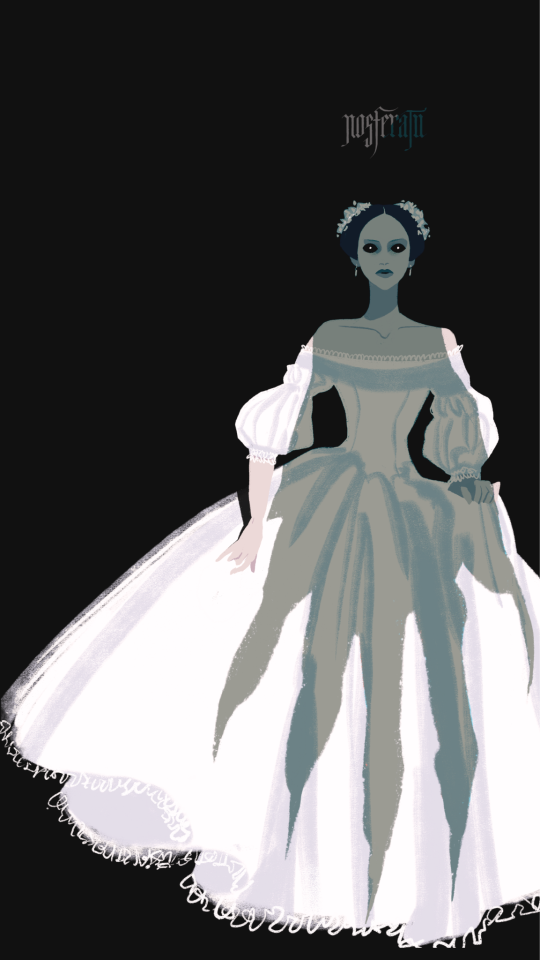Text

Watched It Gets Dark Too Early recently, 10/10 would recommend
Art process under the cut
104 notes
·
View notes
Text
Nosferatu’s Contracts: A Linguistic Deepdive
(This is one half of a blogpost I put on my website! Read the full thing for a full list of sources and even MORE information on the contract from the 1922 film).
So I saw the new Nosferatu film the other day and while I didn't think it was all that fantastic (I loved the first half okay, calm down) the one thing that did stick out to me was the absolutely gorgeous scripts used for the contract that Thomas has to sign. Thank you to this Reddit post for sharing a picture of the entire thing:

The BEAUTIFUL red calligraphy is called Vyaz, a form of decorative Cyrillic calligraphy. In Vyaz script, letters are all joined and interwoven together to create a beautiful, ornamental typographical piece. The Wikipedia page about it is fucking pathetic but it does feature this example of text with a coloured breakdown of the individual words that comprise the piece:

Obviously this itched my language brain like crazy. The best resource I have found since to learn more about Vyaz is this full, free guide written by Viktor Pushkarev. He has also released a 254 page PDF for 25 euros called the Modern Slavic Vyaz Calligraphy Workbook and I think I'm going to have to buy it. His examples look stunning and I would love to learn more about this style of calligraphy. Thank you, Nosferatu.


The Vyaz calligraphy is only one style of writing used in that contract. The other is a completely different style of writing and, surprisingly (or not, maybe?) the best place to look for answers turned out to once again be Reddit. This commenter suggests it's another form of Cyrillic:

Here's some Glagolitic, to compare:

In a different thread, this commenter claims to have cracked it:


This commenter replies with an addition:

So that's cool! In that same thread, this commenter says that the contract looks like a Romanian hrisov, or medieval chancellery charter, and recommends this video explaining how they were written. As you can see from the example below that the commenter shared, these traditional contracts look pretty damn similar to Orlok's contract! So let's talk about them real quick, because it's interesting!

These charters also had explicit and strict structures that they adhered to. This strict standard served to not only prove the legitimacy of a document, but that "the document was drawn up with all due solemnity" (X). Interestingly, each charter would invoke God in the opening lines or would simply have a cross at the beginning, and according to the translations given above Count Orlok's contract does not seem to include this. I recommend checking out the video in its entirety to hear more about this cool bit of history.
But of course... that's not all that's written on the contract, is it? Thomas signs it, and he signs it in Kurrent script, an old traditional form of German cursive. If you'd like to learn how to write in Kurrent, there's a free guide by Margarete Mücke right here! Here's a screenshot I took of the scene along with a Kurrent alphabet for comparison:


Kurrent has a really interesting history. It evolved from gothic cursive at the beginning of the 16th century, which saw a lot of use in the medieval ages. Compared to the vast variety of gothic cursive writing styles, Kurrent was "beautiful, fast to write and comparatively legible" (X). It soon moved out of use solely in chancelleries and into everyday use, becoming more and more standardised.
This script saw a bit of a rollercoaster of popularity; in the early 1900s it was established and taught in all German schools, then steadily became seen as "antiquated and ugly", then the Nazis declared other writing scripts "Un-German" and promoted gothic typography until 1941 when Hitler declared Kurrent and its sister writing style Fraktur "to be of 'Jewish origin' and therefore taboo". More information about this can be found on this page about the history of Old German Script (another name for Kurrent).
So that's that! Count Orlok's contract is based on traditional charters of the region with set structures to highlight their legitimacy and importance as documents, using traditional scripts and handwriting of the time, and is also a style of document that is directly tied to Vlad the Impaler, the inspiration for Dracula and ultimately Nosferatu. Extremely cool and also totally makes sense considering Robert Eggers interest in authentic linguistic detail (like I didn't even mention the language that Orlok speaks throughout the film, which is Dacian, an extinct ancestor of Romanian). Lots of really tasty stuff to look at and I had a blast putting it all together.
Except.......... it's not the end. There's a whole second saga to be told about the contract from the 1922 film, and if you wanna read that (I get deep into talking occult symbols and angel languages) you're gonna have to read the original post on my site!

548 notes
·
View notes
Text
ellen hutter is bisexual and anna harding is lesbian. send post
24 notes
·
View notes
Text

doll-like
or donna with doll joints tattoos !! <3
available on inprnt
2K notes
·
View notes
Text

I should be doing other things but I can't stop thinking about this movie.
This iteration of Nosferatu instantly joins the list of my favourite movies.
It was more than I hoped
4K notes
·
View notes
Text

I loved the scene where Anna and Ellen were cuddling, I love wlw:3
(First post btws!!)
18 notes
·
View notes
Text

Was listening to the Sweeney Todd revival album when I remembered Todd also calls Mrs. Lovett "my sweet"... so I had to quickly draw a Sweeney Todd AU for gelphie
5K notes
·
View notes








